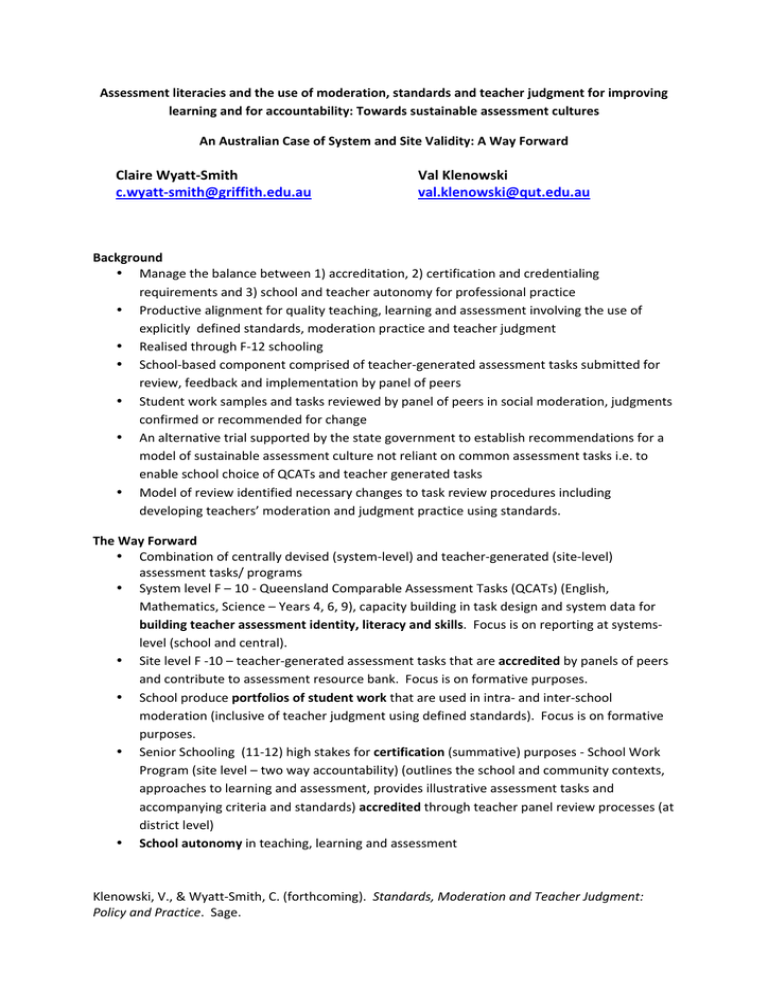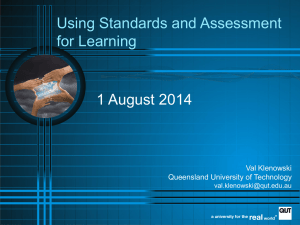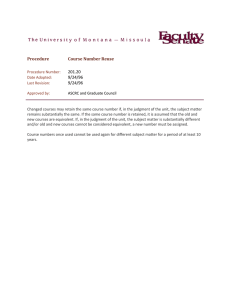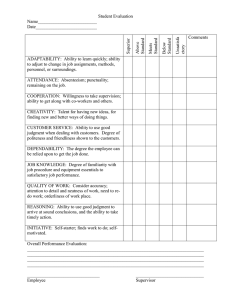Assessment literacies and the use of moderation
advertisement

Assessment literacies and the use of moderation, standards and teacher judgment for improving learning and for accountability: Towards sustainable assessment cultures An Australian Case of System and Site Validity: A Way Forward Claire Wyatt-­‐Smith c.wyatt-­‐smith@griffith.edu.au Val Klenowski val.klenowski@qut.edu.au Background • Manage the balance between 1) accreditation, 2) certification and credentialing requirements and 3) school and teacher autonomy for professional practice • Productive alignment for quality teaching, learning and assessment involving the use of explicitly defined standards, moderation practice and teacher judgment • Realised through F-­‐12 schooling • School-­‐based component comprised of teacher-­‐generated assessment tasks submitted for review, feedback and implementation by panel of peers • Student work samples and tasks reviewed by panel of peers in social moderation, judgments confirmed or recommended for change • An alternative trial supported by the state government to establish recommendations for a model of sustainable assessment culture not reliant on common assessment tasks i.e. to enable school choice of QCATs and teacher generated tasks • Model of review identified necessary changes to task review procedures including developing teachers’ moderation and judgment practice using standards. The Way Forward • Combination of centrally devised (system-­‐level) and teacher-­‐generated (site-­‐level) assessment tasks/ programs • System level F – 10 -­‐ Queensland Comparable Assessment Tasks (QCATs) (English, Mathematics, Science – Years 4, 6, 9), capacity building in task design and system data for building teacher assessment identity, literacy and skills. Focus is on reporting at systems-­‐ level (school and central). • Site level F -­‐10 – teacher-­‐generated assessment tasks that are accredited by panels of peers and contribute to assessment resource bank. Focus is on formative purposes. • School produce portfolios of student work that are used in intra-­‐ and inter-­‐school moderation (inclusive of teacher judgment using defined standards). Focus is on formative purposes. • Senior Schooling (11-­‐12) high stakes for certification (summative) purposes -­‐ School Work Program (site level – two way accountability) (outlines the school and community contexts, approaches to learning and assessment, provides illustrative assessment tasks and accompanying criteria and standards) accredited through teacher panel review processes (at district level) • School autonomy in teaching, learning and assessment Klenowski, V., & Wyatt-­‐Smith, C. (forthcoming). Standards, Moderation and Teacher Judgment: Policy and Practice. Sage. • • Quality assurance processes through external moderation and teacher panels to examine portfolios of student work (summative assessment items only). Focus is on consistency of teacher judgment in the application of exit achievement standards for reporting. Portfolios submitted illustrative of teacher judgment and standards at threshold and mid-­‐band levels. Feedback to schools/teachers to confirm or challenge judgments. Issues • What is common across both sites are need for quality assurances checks and balances at the stage of task design through to moderation involving teacher judgment and standards with a focus on consistency (pedagogy-­‐assessment fit) • Use of suite of standards-­‐moderation-­‐judgment resources: o Statement of achievement standards, o Illustrative exemplars folios of student work (body of evidence) or single tasks o Processes of arriving at an overall judgment (recognition of tacit and explicit knowledge) o Cognitive commentary that explicates the processes that were relied upon to make an overall on-­‐balance judgment. This includes statements about the evidence used in matching the standards to the student work inclusive of the trade-­‐offs or compensations that are made in arriving at the judgment (award of grade). • Building teachers’ assessment capabilities • Deep structures of teacher judgment -­‐ research is currently in infancy • Moderation processes and protocols especially for inter-­‐site regional settings • Moderation serves the purpose of quality assurance and fulfils a role in calibrating teacher judgment involving the use of achievement standards as the consistent measure of quality. Standards and exemplars will not lead to consistent judgments in and of themselves. Moderation practice is central to sustainable assessment cultures for system and site validity. Klenowski, V., & Wyatt-­‐Smith, C. (forthcoming). Standards, Moderation and Teacher Judgment: Policy and Practice. Sage.



